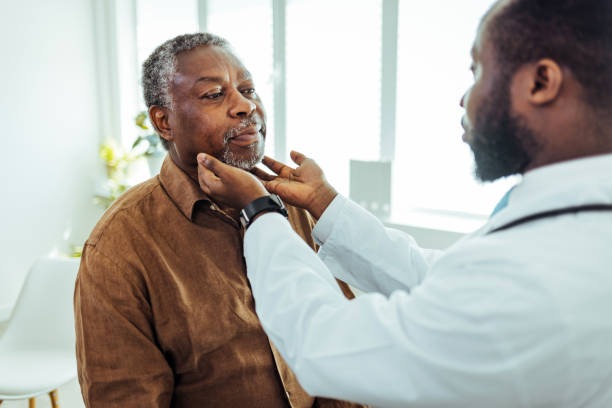(ThyBlackMan.com) The health and well-being of Black men is a topic of paramount importance that demands our collective attention and action. Black men face significant health disparities that not only affect their individual lives but also have profound impacts on their families, communities and the broader society.
Addressing these disparities and promoting the health of Black men is not merely a matter of individual well-being; it is a crucial step toward fostering stronger, more resilient communities.
The health disparities faced by Black men are well-documented. According to the Centers for Disease Control and Prevention, Black men have higher rates of chronic illnesses such as hypertension, diabetes and heart disease compared to their White counterparts. They are also more likely to die from these conditions.

Additionally, Black men experience higher rates of certain cancers – including prostate and colorectal cancer – and have lower survival rates for these diseases.
These disparities are not solely due to genetic factors but are deeply rooted in social determinants of health, including access to health care, socioeconomic status, education and environmental factors.
One of the most striking health disparities is the significantly shorter life expectancy of Black men. On average, Black men live about six years less than White men. This gap is a stark reminder of the systemic inequities that continue to plague our health care system.
These inequities are compounded by factors such as racial bias in medical treatment, lack of access to preventive care, and socioeconomic challenges that limit opportunities for healthy lifestyles.
The impact of poor health on Black men extends beyond the individual to the entire community. When Black men are healthy and thriving, their families are stronger and more stable. Children benefit from having healthy, active fathers and role models who can fully participate in their lives. Healthy Black men contribute to the economic stability of their families and communities, as they are better able to work, provide and participate in community activities.
Moreover, the health of Black men is inextricably linked to the overall health and well-being of the Black community. When Black men face significant health challenges, it places a strain on community resources and social structures. Health care costs rise, and the burden of care often falls on family members, who may themselves face health challenges and economic hardships. By contrast, when Black men are healthy, they can contribute to community resilience, leadership and economic prosperity.
Promoting the health of Black men requires a multifaceted approach that addresses both individual and systemic factors. It begins with raising awareness about the importance of preventive care and encouraging regular health screenings.
Education and outreach efforts must be culturally tailored and accessible, addressing the unique needs and concerns of Black men. This includes dispelling myths and misconceptions about health care and promoting positive health behaviors.
Access to quality health care is another critical component. This means not only increasing the availability of health care services in underserved communities but also ensuring that these services are culturally competent and responsive to the needs of Black men. Health care providers must be trained to recognize and address implicit biases that can affect the quality of care. Policies that expand health care coverage and reduce economic barriers to accessing care are essential.
Community engagement and support are also vital. Black men need safe spaces where they can discuss their health concerns, share experiences and receive support. Community organizations, faith-based groups and social networks play a crucial role in providing this support and fostering a culture of health. Initiatives such as the African American Male Wellness Walk, which our agency proudly sponsors, create opportunities for Black men to come together, get active and access health resources in a supportive and empowering environment.
At the African American Male Wellness Agency, we are dedicated to saving Black men’s lives and promoting their health through comprehensive programs and initiatives. Our mission is to eliminate health disparities and improve the quality of life for Black men. Through our annual Wellness Walks, health fairs, and community outreach events, we provide free health screenings, educational workshops, and resources to thousands of men. Our programs focus on prevention, early detection, and management of chronic diseases, as well as mental health support and wellness education.
We also advocate for policies that address the social determinants of health and promote equity. By partnering with health care providers, policymakers and community organizations, we work to create systemic change that benefits not only Black men but also their families and communities. Our efforts are driven by the belief that when Black men are healthy, our entire community thrives.
Finally, addressing the social determinants of health is essential for creating lasting change. This includes efforts to improve education, economic opportunities and housing conditions in Black communities. It also means advocating for policies that address systemic racism and promote equity in all areas of society. When we address these root causes, we create conditions where Black men can achieve optimal health and well-being.
In conclusion, the health of Black men is a critical issue that has far-reaching implications for individuals, families and communities. By addressing health disparities and promoting the well-being of Black men, we can build stronger, more resilient communities where everyone has the opportunity to thrive. It is a collective responsibility that requires commitment, action and a vision for a healthier future for all.
Written by Kenny Hampton
Official website; https://aawellness.org/

















There will alway be health disparities in our black community compare to other communities because the care provided to blacks by Whtie, Hispanic, Asian, Armenians, Middle easteerns Doctors and Nurses is very mediocre since these other racial groups do not care about us and they purposely prescribed us the wrong medication or the medication that will cause severe adverse reactions etc.. We will never receive a care from any Doctor that does not look like us or suffer like us because America is not in the business of saving black people; but in the business of killing black people during birth and when ever you decide to conduct an anual physical examination or visit a dentis and or eye doctor.
What is our Solution Black America?
Well, is very simple, it is time for black people to wake up and stop the bullshit of Kumbaya with other races because other races do not give a Frack about us and will never do anything to make black America better than tthem. Black people need to start asking a visiting Clinics and hosptials with black Doctors and Black nurses. If you have health insurance or life insurance then your Doctor should be black, your insurant agent should be black, your Dentist should be black, your Optometrist should be black. Only a black person understand and knows the body and emotional situation of another black person.
You will never see an Armenian, Jewish, Chinese, Korean, Dominicans going to a black Doctor, it will never happen, they do not allow it in their community. an Armenian, an Hispanic men will never allow his armeninan, Hispanic wife and daughter to be examine by a black Doctor. No, it will not happen; therefore, Black people need to start thinking like these racist people and not let any of them touch your body or prescribe you any medication. it is time for black people to only make Doctor appointments with black Doctors and Black nurses.
Likewise, black people should only hire black plumbers, gardeners, electricians, carpenters, drivers, painters, mechanic etcll to work on your home, car and anything that you need help with. Black for Black; For us by us. Now, do not sit here and say that my words are racist because if you pay attention you will notice that when Asian, Jews, Armenian, Ukraninans, Hispanics open a business or hire someone to do a job at their home or vehicle they always hire, rent or use their own people and their owne community. they never asked black for anthing except for yor to spend your black dollars in their stores and they will use that money to hire their own people, to send their own pepple money abroad, to send their racist kids to college, to open more businesses and hire their own people; while they spit and shit in your food and laught at you while they hand you over your food and you hand them over your black dollars.
So wake up black men, women and LGBT because we are at war with every other race that only wishes death and destruction on our community.